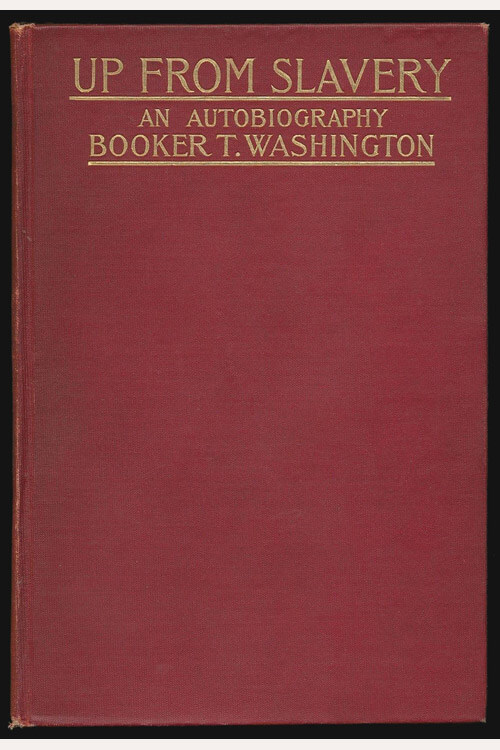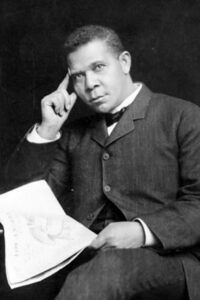
Up From Slavery: An Autobiography
Up from Slavery is the 1901 autobiography of the American educator Booker T. Washington (1856–1915). The book describes his experience of working to rise from being enslaved as a child during the Civil War, the obstacles he overcame to get an education at the new Hampton Institute, and his work establishing vocational schools like the Tuskegee Institute in Alabama to help Black people and other persecuted people of colour learn helpful, marketable skills and work to pull themselves, as a race, up by the bootstraps. He reflects on the generosity of teachers and philanthropists who helped educate Black and Native Americans.
He describes his efforts to instil manners, breeding, health, and dignity into students. His educational philosophy stresses combining academic subjects with learning a trade (reminiscent of John Ruskin). Washington explained that integrating practical subjects is partly designed to “reassure the White community of the usefulness of educating Black people”. The book was first published as a serial in 1900 in The Outlook, a Christian newspaper in New York. It was serialized so that Washington could receive feedback from his audience during the writing and adapt his work to his diverse audience. Washington was a controversial figure during his lifetime, and W. E. B. Du Bois, among others, criticized some of his views.
The book was a best-seller and remained the most popular African-American autobiography until that of Malcolm X. In 1998, the Modern Library listed the book as No. 3 on its list of the 100 best nonfiction books of the 20th century, and in 1999, it was also listed by the conservative Intercollegiate Review as one of the “50 Best Books of the Twentieth Century”.
Read or download Book
Booker T. Washington
Booker Taliaferro Washington (April 5, 1856 – November 14, 1915) was an American educator, author, orator, and adviser to several presidents of the United States.
Biography
Between 1890 and 1915, Washington was the dominant leader in the African-American community and of the contemporary Black elite. Washington was from the last generation of Black American leaders born into slavery and became the leading voice of the former slaves and their descendants. They were newly oppressed in the South by disenfranchisement and the Jim Crow discriminatory laws enacted in the post-Reconstruction Southern states in the late 19th and early 20th centuries. Washington was a key proponent of African-American businesses and one of the founders of the National Negro Business League.
His base was the Tuskegee Institute, a normal school, later a historically Black college in Tuskegee, Alabama, where he served as a principal. As lynchings in the South reached a peak in 1895, Washington gave a speech known as the “Atlanta Compromise”, which brought him national fame. He called for Black progress through education and entrepreneurship rather than trying to challenge directly the Jim Crow segregation and the disenfranchisement of Black voters in the South. Washington mobilized a nationwide coalition of middle-class blacks, church leaders, and white philanthropists and politicians, with a long-term goal of building the community’s economic strength and pride by a focus on self-help and schooling. With his contributions to the Black community, Washington was a supporter of racial uplift, but secretly, he also supported court challenges to segregation and restrictions on voter registration. Washington had the ear of the powerful in the America of his day, including presidents. His mastery of the American political system in the later 19th century allowed him to manipulate the media, raise money, develop strategy, network, distribute funds, and reward a cadre of supporters. Because of his influential leadership, the timespan of his activity, from 1880 to 1915, has been called the Age of Booker T. Washington.
Nevertheless, opposition to Washington grew as it became clear that his Atlanta compromise did not produce the promised improvement for most Black Americans in the South. William Monroe Trotter and W. E. B. Du Bois, who Bookerites perceived in an antebellum way as “northern Blacks”, found Washington to be accommodationist and his industrial (“agricultural and mechanical”) education inadequate. Washington fought vigorously against them and succeeded in his opposition to the Niagara Movement that they tried to found but could not prevent their formation of the National Association for the Advancement of Colored People (NAACP), whose views became mainstream.






